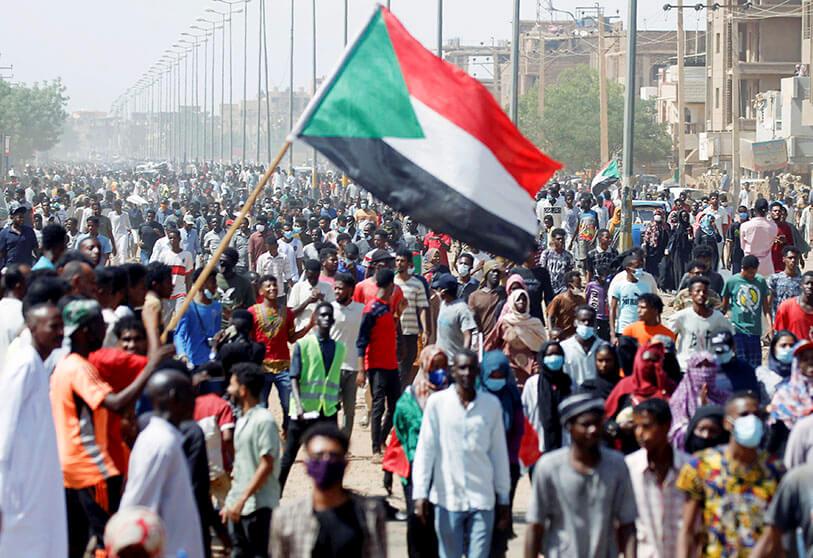New Alliance Will Support Anti-Corruption Reporters in Sudan

Reporting on corruption in Sudan was life-threatening work during the dictatorship of Omar Al-Bashir. At a recent gathering of local investigative journalists organized by the Center for International Private Enterprise (CIPE) and the Al-Khatim Adlan Center for Enlightenment (KACE), one reporter described how her car was followed and then rammed by another vehicle while she was conducting an investigation.
Until as recently as two years ago, intimidation, violence, and subversion were commonly used against media outlets and professionals who refused to tow the line. “We were very cautious. We were a minority in our own newspaper,” said Alhaj Warrag, Chairperson of The Democrat newspaper in Khartoum and a leading pro-democratic journalist since 1989. The old regime used the press as a “method of control…[and] heavily infiltrated the media.”
Things have gotten better since the country’s 30-year dictatorship was overthrown by a civilian-led revolution in June 2019. While the transitional government is composed of an uneasy coalition of civilian and military leaders, players from the old regime are still lurking. And with legacy institutions and bureaucrats, many corrupt systems are still in place.
“[Before], you had to have a license to work as a journalist. Now, because they didn’t change the law, they didn’t change the license [requirement]”, Warrag said. “You [still] have to hire 17 registered journalists to start a paper… You have to take their people.”
Fighting Chance
But change is in the air. At the CIPE forum held in February, pro-democracy journalists launched a new alliance committed to investigating corruption in Sudan entitled the Journalists for Anti-Corruption Initiative. The group’s founding provided an opportunity to discuss the challenges that face journalists who investigate the country’s corruption problems.
For one, only a few local journalists are not politically compromised. “You find many corrupt journalists,” Warrag said. During the old regime, “whenever you started [a paper], they would get a lot of infiltrators inside the platform [to try to] destroy it from within. Now the situation is far better. [But] unless you are cautious enough, it could happen again. It could be hijacked.”
But among the few politically independent journalists, most are not trained to conduct anti-corruption investigations. And those who do lack security and protection.
Another issue is the lack of accurate public data about government services, activities, and funding. Information about private owners of real estate, businesses, and other organizations is also scarce. Though Sudan has a freedom of information law, one journalist at the CIPE forum described having to take a government institution to court in order to receive generic information about its activities.
The new anti-corruption alliance will help address some of these issues. “Organizing journalists against corruption [will] coordinate…efforts [and] provide solidarity and resources and training, especially for young fresh journalists,” said Warrag.
In addition to technical training, the new initiative will help protect the anonymity of investigators. It will also strengthen campaigns to increase government disclosure by unifying fragmented advocacy, social media, and research efforts by individual pro-democracy journalists.
“Sudan’s transition process is messy and non-linear,” said Mohamed Abdel-aziz, Head of the political department in Aldimograti Newspaper and co-creator of the new alliance. “[The] Journalists Against Corruption Initiative [will] mobilize resources…for in-depth media work based on reports and investigations to address corruption”.
Uphill Battle
The new initiative has its work cut out opposing Sudan’s deeply embedded interests that benefit from corruption. The fate of Sudan’s promised democracy, too, hangs in the balance.
“The forces opposing democratic transition…are basically corruption networks,” Warrag explained. “They are a natural social base because of corruption, because they are afraid of justice…[and] want impunity against their crimes. So unless you fight corruption and you fight it with determination and with smart efforts…we will lose democratization, definitely.”
The journalist initiative is one of a growing number of anti-corruption efforts in Sudan. In June 2020, the CIPE-backed Sudan Anti-Corruption Resource Center (SARC) was launched to support Sudanese civil society, media, business, and government efforts against corruption. SARC has supported KACE and CIPE’s co-sponsored forum series that has brought together representatives from the media, civil society, business, and government to discuss new strategies to reduce corruption.
To support journalists, SARC is sponsoring an annual prize for anti-corruption reporting and a new publication that will compile top reports on governance and corruption issues in Sudan. Warrag hopes these efforts will inspire the rising generation to get involved.
“The most important thing now is to get fresh air to the field…to train new journalists and new graduates,” Warrag said. “This is why if you organize such a platform. If you manage to train new generations then you will change the situation.”
Editor’s note: CIPE’s anti-corruption and private sector development initiatives in Sudan are cited in a new Investment Prospectus just released by Sudan’s Ministry of Investments and International Cooperation.
Benjamin Schmidt is an Associate Program Officer with CIPE’s Anti-Corruption and Governance Center.
Image: Creative Commons
